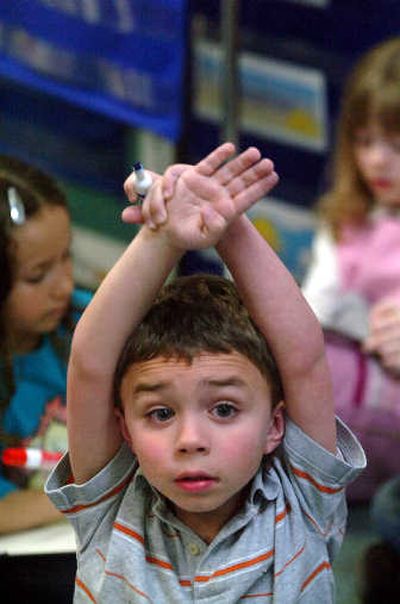Kindergarten goes full-day

The walls of Mrs. Golden’s kindergarten class are covered with the alphabet, with shapes and colors, with drawings of “The Cat in the Hat.”
But the Logan Elementary teacher is doing more than academics. She’s teaching manners, patience and cooperation. She’s helping negotiate conflicts and enforcing the rules.
“If somebody needs new shoes,” Mary Golden says, “we find a way to get them new shoes.”
This year for the first time, Golden and some other kindergarten teachers in Spokane’s poorest neighborhoods are teaching full-day classes. Part of a new state grant, all-day kindergarten is targeted toward students who may already be at a disadvantage in school – students who typically have been exposed to less language and fewer learning experiences than others.
“I think it’s important, especially for these high-poverty areas, that these kids have more time to learn,” Golden said. “They’ve been given the gift of time to develop.”
Experts say that when it comes to helping children overcome obstacles like poverty, abuse and neglect, getting them help early is crucial. By the time children enter kindergarten, some are already well behind their peers, according to a brief prepared for Child Trends, a nonprofit research center in Washington, D.C.
“Some have health problems that impede their ability to learn,” the report says. “Others lack the cognitive skills that are associated with early academic achievement. Some lag behind others in the social and emotional skills that are needed for successful classroom participation. And still other children may be behind in all three of those areas.”
The idea of schools playing a larger role for kindergartners isn’t new. Golden and others proposed an all-day kindergarten program at Logan to the district three years ago, but it wasn’t funded.
“There’ve been schools all over the country doing it for a long time,” teacher Marci McQuary said. “They couldn’t refute the data, so I think it was about funding.”
But the Washington Legislature approved “all-day K” on a trial basis in 2007, directing nearly $1 million to Spokane Public Schools to implement the program in five schools. That was part of a statewide plan that put full-day kindergarten into schools with the highest percentage of students receiving free or reduced-price meals.
Next year, state funding for all-day K should grow to about $2.2 million, with an expansion to six more schools in the Spokane district. The district still has to pick up costs associated with the program, which has been running about 15 percent of state funding.
The data about early childhood learning breaks down along income lines. In the teachers’ proposal for all-day K, they cited research showing that the average 4-year-old in a family receiving welfare has heard about 13 million words, while a child from a professional family has heard more than three times that many.
Those disparities continue into other areas – time spent reading, learning to count and experiencing different parts of the world.
“In fact, full-day kindergarten positively impacts learning across cognitive, language and expressive, and personal and social domains,” the teachers wrote in their grant proposal.
A large part of all-day K deals with teaching skills that aren’t directly academic. While students work to learn language and math skills, Golden spends a lot of time teaching them to get along with each other, communicate positively and control their emotions.
Teaching those skills can be hugely important down the line, experts say, because it is frequently non-academic issues that become the biggest stumbling blocks for kids from at-risk families.
Children who have been abused, neglected or subjected to other forms of trauma, for example, may simply lack the verbal skills to express what’s going on in their lives appropriately – and as they progress through the school system they can develop a pattern of conflicts with teachers and others.
“A lot of them don’t know how to verbalize that there’s even a problem,” McQuary said.
And in a district like Logan’s – where eight of 10 students qualify for free or reduced-price lunch – sometimes the problems fall short of abuse but still can wreak havoc on a child’s academic foundations.
“Sometimes they come to school hungry,” said Stacy Loudermilk, Spokane Public Schools manager of early learning and child care. “It’s pretty hard for any of us to concentrate on our tasks if we’re hungry.”
On a recent day in Golden’s classroom, children spent plenty of time on their own or in small groups, reading and practicing spelling. They gathered and read a poem, “Three in the Bed,” with a special emphasis on the word of the day: said.
The students had a sharing period, a variation on show-and-tell. Golden opened the session with an admonition.
“We had a couple problems yesterday with being an audience,” she said. “What does it mean to be a good audience?”
Sometimes, the sharing time is when teachers see a glimpse into the troubled lives their students lead – as when a student talks about visiting a parent in jail. They know that what they’re doing extends beyond the alphabet and the word of the day.
“A lot of times in the day our kids will say, ‘I love you, teacher,’ ” McQuary said. “They know we’re firm, but we adore them no matter what.”